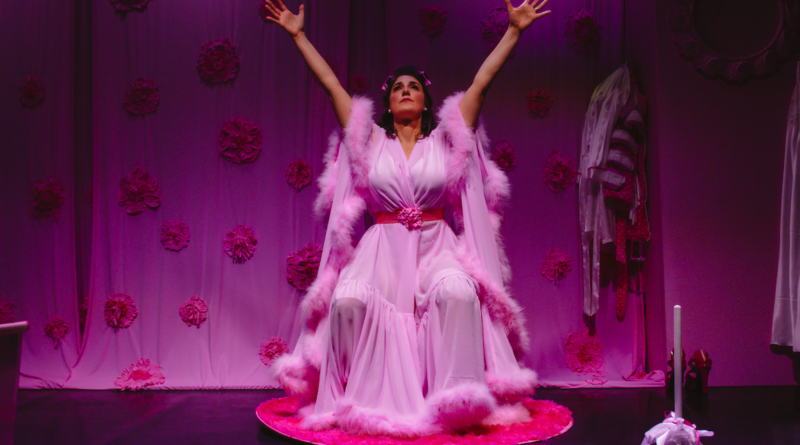INTERVIEW: Marriage explored in new comedic dance piece, ‘Burnt-Out Wife’
Photo: Sara Juli choreographed and dances in Burnt-Out Wife. Photo courtesy of Nick Pierce / Provided by Janet Stapleton with permission.
Choreographer Sara Juli’s new comedic dance piece, Burn-Out Wife, is set for a series of weekend performances Feb. 21-28 at Dixon Place in New York City. The new “feminist solo” performance, as it’s being billed, takes a close look at marriage, loneliness, monogamy and intimacy, according to press notes.
Juli, who is now located in Maine, has been creating comedic dance routines for 20 years, and throughout the last two decades, audience members have had the chance to catch her work at Performance Space 122, the Chocolate Factory Theater and New York Live Arts, among other companies and venues.
This new premiere has the action play out in a pink bathroom, and although there will be important conversations about marriage and love in the 21st century, a laugh will never be too far away.
Recently Juli exchanged emails with Hollywood Soapbox about her new show, which she also performs in. Questions and answers have been slightly edited for style.
What inspired Burnt-Out Wife?
For 20 years I have been making work that brings very personal topics to the stage. Using movement, text, song, sounds, audience interaction and humor, I create what I call ‘healing dances’ to help reconcile something that is bothering me. I wait for the topics to come to me, rather than seek them out.
For Burnt-Out Wife, I had arrived at a place of frustration, a place of being in love with my husband, but challenged by the construct of marriage and challenged by our blocked marital patterns that began close to 17 years ago. So the time came to make a performance piece about it. In creating and performing these works, I am aiming to also connect to audiences. Am I the only person challenged by marriage? I don’t think so. I’m trying to approach the topic with vulnerability and humor as a way to acknowledge the burdens and laugh at the same time — only then can I begin the journey of being able to see what’s in front of me. My further aim is to provide a space, during the live performance, where audiences can co-exist or connect to their own journey in real time.
Would you call the piece a feminist show?
I’ve had other people call my work feminist, including my previous show, Tense Vagina: an actual diagnosis, which was about postpartum depression and post childbirth urinary incontinence. I try and stick with what I know, which is storytelling from a personal point of view. I create female performance characters who have the ability to speak and move with honesty and authenticity, and I have made works that address and touch upon motherhood, death, promiscuity, religion, money and now marriage, all from a personal lens. Is that feminism? I’m not sure.
What are some of the themes that you hope the piece addresses?
Loneliness, pain, anger, sex, monogamy — you know, the usual.
How do you creatively combine comedy with dance?
I have been developing a singular vocabulary for over 20 years that seamlessly fuses movement with text, humor, sound, song and audience interaction. I arrive at the material originally through journaling, and for this work, a lot of ideas came from months of marriage counseling with my husband. Using journaling, therapy, my extensive training in dance improvisation, innate comedic timing and the ability to use my personal stories as a way to connect to audiences, I fuse these forms together to create a performance experience that is both poignant, devastating and funny. I try and avoid laughs for laughs, but rather have the audience laugh come from a deeper place because I’ve landed on something authentic or awkward or private.
When did you realize you had good comedic timing and the talents to bring humor to movement?
When I was in my early 20s, audiences consistently laughed during my performances when I thought I had made something very serious. I remember being so confused. Over the years I started to learn that having the ability to make audiences laugh was an absolute gift, and so then I began to harness that ability to use humor strategically to make a point. Now I expect people to laugh during my shows, which is very different than how I began. I’m trying to keep moving the craft forward, and so this past year I took a stand-up comedy class for the first time and wrote 10 minutes of pure stand-up that exists inside the piece. While I’m still learning stand-up, I’m loving the textural shift of having it as part of the show.
What’s the arts scene like in Maine?
It’s wonderful. It’s big enough that established artists live and work here, and big names come through the state all the time. Yet it’s small enough that you can be a part of its growth and make an impact if you so choose. Moving from NYC to Maine has opened-up my artistic practice more than I ever could have imagined. There is time and space and collaborators with tremendous talent all here. While I certainly miss the energy and excitement of NYC’s arts scene, it’s a blessing to have Maine as my artistic home.
By John Soltes / Publisher / John@HollywoodSoapbox.com
Sara Juli’s Burnt-Out Wife will play Feb. 21-28 at Dixon Place in New York City. Click here for more information and tickets.

